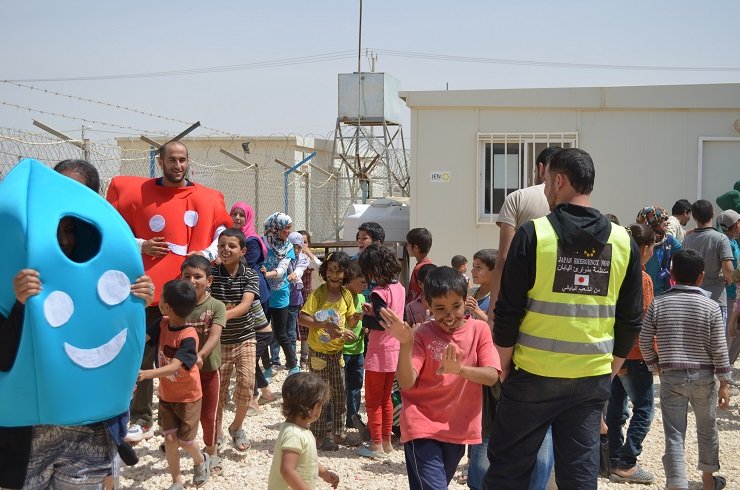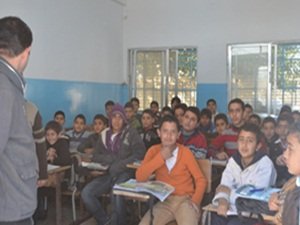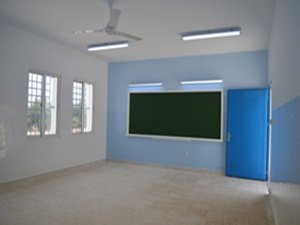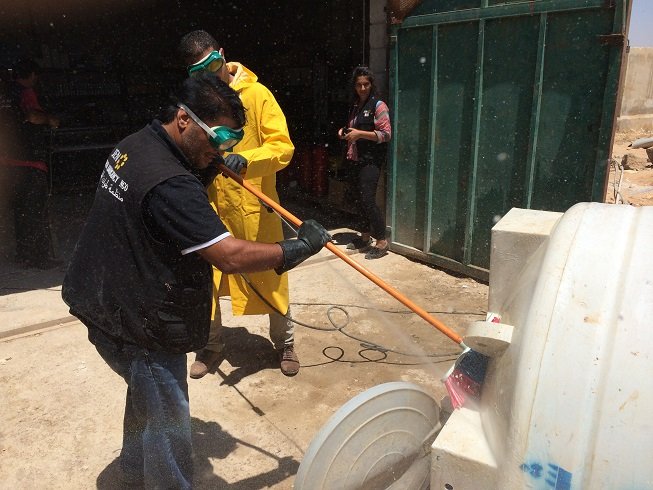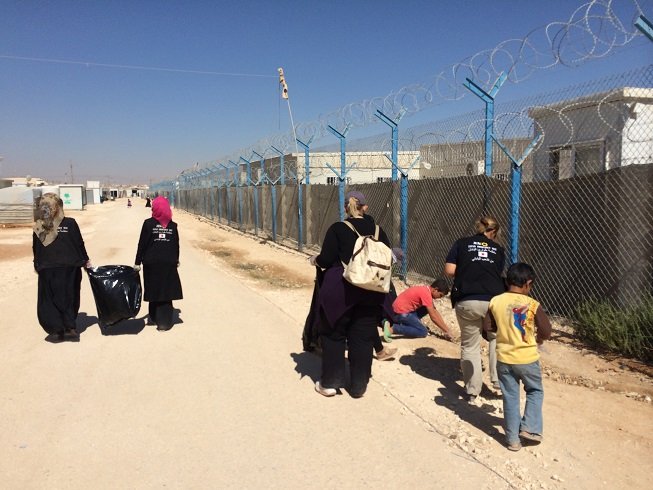By Miyako Hamasaka | PR Manager
World Environment Day Hygiene Promotion Event in Za’atari Camp
JEN conducts hygiene education activities in order for Syrian refugees to live in sanitary environments with access to clean water and to decrease illnesses associated with poor hygiene. In Za’atari Camp, over half of the population of about 80 thousand is 17 years old and younger. Activities targeting children are necessary since it also results in their psychological care.
June 5th was World Environment Day; therefore from June 3rd to June 5th we conducted a three-day hygiene promotion event. This was geared towards having the children in Districts 3, 4 and 5 of the Za’atari Refugee Camp enjoy learning about hygiene.
On the 1st and 2nd days of the event, JEN promoters conveyed hygiene messages to children through games, songs, quizzes and dances. JEN will repeatedly hold such events aimed at having children learn how to practice good personal hygiene and acquire the habit of washing their hands and faces.
On the 3rd day of the event, JEN’s promoters organized focus groups with adults in order to discuss saving and safety of water. The promoters participated in group meetings as advisers, where several issues of waterborne diseases such as diarrhoea, as well as water conservation were discussed. On the same day, for the purpose of raising awareness of environmental protection, refugees planted sage in their camp located in the middle of desert. At the present time, refugees face problems such as an unhygienic environment and plagues of flies and mice because of the lack of trees and poor drainage.
JEN will keep working with the refugees in bettering the environment of the camp, providing safe water and familiarizing themselves with the practice of washing their hands and brushing their teeth.
Completion of the Construction of 12 Classrooms
As a part of host community assistance activities, JEN built 12 classrooms in 4 schools and repaired water facilities such as bathrooms and hand-wash facilities in Irbid, Mafraq and Zarqa Prefectures.
The number of Syrian refugees has sharply increased and Syrian children have started attending public schools in the Prefectures in Jordan. However, the local schools cannot cope with the sudden surge of students. At the moment, the Syrian and Jordan children have to study in classrooms that are too small for them. To deal with this issue, it is imperative additional classrooms are built and water facilities are prepared.
In order to cope with an increasingly overcrowded learning environment, Jordan's Ministry of Education has adopted a double shift system in crowded schools. However, students cannot attend classes in the schools full-time due to the system. The student's school time is reduced.
JEN will continue to enhance the learning environment by repairing water facilities and constructing additional classrooms. We will keep working hard for both Syrian and Jordan children so that they do not become hindered by their educational environment.
Washing and Chlorinating Water Tanks
From July, we had been cleaning and disinfecting 311 drinking water tanks with chlorine in JEN’s activity area. Our staff had been working to clean up 10 to 15 tanks per day with chlorine. In the region, the temperature gradually rises from May, exceeding 30 degrees C in the summer time. As every refugee uses the water in the tanks as drinking water, we were concerned about the hygienic situation worsening due to heat.
Water tanks were set in various places and water was supplied to all tanks every day. JEN worked to wash and disinfect the tanks with chlorine in the three districts where it is working as a focal organization of the hygiene issue. Polluted water may cause serious health problems so we do our best to ensure healthy and safe living in Za’atari camp.
Cleaning Up the Camp
Each month, JEN launches a cleaning campaign with the people in Za’atari camp. The main objective of the campaign is to have the refugees be motivated to keep their environment clean. JEN organized August’s campaign on August 27th.
During the campaign, JEN’s staff asked the community to participate in the campaign. Because some refugees do not view the camp as their permanent home, less attention is paid to the environment. However, the campaign raises awareness of the disadvantages of littering in the streets and the prevention of disease caused by bad hygiene practices. In August the total number of participants was around 20 refugees.
One of the participants shared his thoughts with us saying, “This campaign is a good opportunity to work with agencies and the community together. I hope this activity will continue.” Another participant also commented, “I like this campaign with JEN because the community can work together. It will not only improve the environment but also prevent disease caused by hygiene problems.”
Links:
Project reports on GlobalGiving are posted directly to globalgiving.org by Project Leaders as they are completed, generally every 3-4 months. To protect the integrity of these documents, GlobalGiving does not alter them; therefore you may find some language or formatting issues.
If you donate to this project or have donated to this project, you can receive an email when this project posts a report. You can also subscribe for reports without donating.
